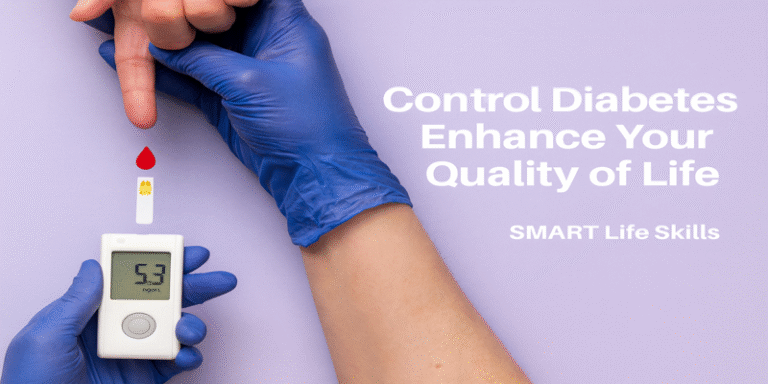Type 2 diabetis is a chronic metabolic disorder characterised by insulin resistance and relative insulin deficiency. Unlike Type 1 diabetis, which is autoimmune in nature, Type 2 diabetis is primarily linked to modifiable risk factors such as poor diet, physical inactivity, and obesity. As its prevalence continues to rise globally—especially in low- and middle-income countries—it has become a significant public health concern. Lifestyle interventions, including diet, physical activity, and behavioural changes, are widely recognised as the cornerstone of Type 2 diabetis prevention and management (World Health Organization, 2023).
1.0 Understanding Type 2 Diabetis
Type 2 diabetis occurs when the body becomes resistant to insulin or when the pancreas does not produce enough insulin to maintain normal blood glucose levels. Symptoms often develop slowly and may include increased thirst, frequent urination, fatigue, and blurred vision. Unlike Type 1 diabetis, which typically manifests in childhood or adolescence, Type 2 is more common in adults, though its incidence in children is increasing due to rising obesity rates (American Diabetes Association, 2022).
Risk factors include age, genetic predisposition, obesity (particularly central obesity), a sedentary lifestyle, and poor dietary habits. According to the National Institute for Health and Care Excellence (NICE, 2022), early identification and intervention are crucial to delay or prevent the onset of complications such as cardiovascular disease, kidney failure, and neuropathy.
2.0 The Role of Diet
Dietary modification is one of the most effective lifestyle interventions for preventing and managing Type 2 diabetis. A balanced diet rich in fruits, vegetables, whole grains, lean proteins, and healthy fats can help control blood glucose levels, reduce insulin resistance, and support weight loss.
The Mediterranean diet, characterised by high consumption of olive oil, nuts, legumes, and fish, has been shown to be particularly beneficial. A study by Esposito et al. (2014) demonstrated that adherence to the Mediterranean diet led to a significant reduction in the risk of developing Type 2 diabetis among high-risk individuals.
Reducing the intake of processed foods, sugary drinks, and refined carbohydrates is also critical. The NHS (2023) recommends choosing foods with a low glycaemic index (GI), as these release glucose more slowly into the bloodstream, thereby preventing spikes in blood sugar levels.
3.0 Physical Activity and Exercise
Regular physical activity improves insulin sensitivity, aids weight control, and enhances overall metabolic health. The World Health Organization (2023) advises at least 150 minutes of moderate-intensity aerobic physical activity per week for adults, or 75 minutes of vigorous-intensity activity.
Structured exercise programmes, including both aerobic and resistance training, have shown positive outcomes in managing Type 2 diabetis. Umpierre et al. (2011) conducted a meta-analysis that found significant improvements in glycaemic control and reduced HbA1c levels among individuals engaging in structured exercise programmes.
Moreover, lifestyle physical activity—such as walking, cycling, and using stairs—can be easily integrated into daily routines, making it a sustainable intervention for many people.
4.0 Weight Management
Obesity is a major risk factor for Type 2 diabetis. Losing even a modest amount of weight—5% to 10% of body weight—can significantly improve insulin sensitivity and glycaemic control (Lean et al., 2019). The DiRECT trial, a landmark study conducted in the UK, showed that intensive weight management through a low-calorie diet led to remission of Type 2 diabetis in nearly half of the participants at one year (Lean et al., 2018).
Weight management strategies should include dietary counselling, regular exercise, and behavioural support. Importantly, these interventions should be tailored to the individual’s needs, preferences, and cultural context to improve adherence and outcomes.
5.0 Behavioural and Psychological Support
Changing long-standing lifestyle habits can be challenging. Psychological and behavioural support plays a vital role in helping individuals make and sustain healthy changes. Interventions such as cognitive behavioural therapy (CBT), motivational interviewing, and self-monitoring have shown efficacy in promoting healthy behaviours and improving glycaemic control (NICE, 2022).
Peer support groups and diabetes education programmes also provide valuable social support and practical knowledge, empowering individuals to take control of their health. The NHS Diabetes Prevention Programme is one such initiative in the UK that offers lifestyle coaching and group-based interventions for individuals at high risk (NHS, 2023).
6.0 Technology and Lifestyle Management
The use of digital health tools, such as mobile apps, wearable devices, and telehealth services, is increasingly popular in supporting lifestyle changes. These tools allow for continuous monitoring of diet, physical activity, and blood glucose levels, thereby enhancing self-management and clinician-patient communication.
A study by Bonoto et al. (2017) found that mobile health interventions improved medication adherence and glycaemic outcomes in patients with Type 2 diabetis. However, accessibility and digital literacy remain potential barriers, particularly among older populations and those in underserved areas.
7.0 Ideal Blood Sugar (Glucose) Levels Before and After Meals
Here’s a clear and evidence-based summary of ideal blood sugar (glucose) levels before and after meals, based on recommendations from the World Health Organization (WHO), American Diabetes Association (ADA, 2023), and UK’s National Institute for Health and Care Excellence (NICE, 2022).
7.1 Ideal Blood Sugar Levels for Adults with Diabetes (General Targets)
| Timing | Ideal Range (mmol/L) | Ideal Range (mg/dL) | Notes |
| Before meals (fasting or preprandial) | 4.0 – 7.0 mmol/L | 72 – 126 mg/dL | This includes before breakfast, lunch, or dinner. Ideally closer to 5–6 mmol/L. |
| 2 hours after meals (postprandial) | < 8.5 – 9.0 mmol/L | < 153 – 162 mg/dL | Aim to stay below these levels 2 hours after eating. |
| At bedtime | 6.0 – 8.0 mmol/L | 108 – 144 mg/dL | Prevents overnight hypoglycaemia and morning spikes. |
| HbA1c (long-term average) | ≤ 48 mmol/mol (6.5%) | — | Indicates average blood sugar over 2–3 months. |
7.2 Meal-Specific Targets
| Meal | Before Eating (Pre-meal) | 2 Hours After Eating (Post-meal) |
| Breakfast | 4.0 – 6.5 mmol/L (72–117 mg/dL) | < 8.5 mmol/L (<153 mg/dL) |
| Lunch | 4.0 – 7.0 mmol/L (72–126 mg/dL) | < 8.5 – 9.0 mmol/L (<153–162 mg/dL) |
| Dinner | 4.0 – 7.0 mmol/L (72–126 mg/dL) | < 8.5 – 9.0 mmol/L (<153–162 mg/dL) |
7.3 Note:
- Individual targets can vary based on age, type of diabetes, duration of disease, other medical conditions, and risk of hypoglycaemia.
- For older adults or those with other health conditions, targets may be slightly less strict (e.g., pre-meal 5–8 mmol/L, post-meal <10 mmol/L).
- For pregnant women with gestational diabetes, stricter control is often required (e.g., fasting <5.3 mmol/L, post-meal <6.7 mmol/L).
7.4 Quick Self-Monitoring Tips
✅ Test before and 2 hours after main meals to see how food affects your levels.
✅ Keep a blood glucose logbook or use a digital glucose tracker.
✅ If post-meal levels rise above 9 mmol/L frequently, review meal composition, carbohydrate load, and medication timing with your healthcare provider.
✅ Combine regular monitoring with HbA1c tests every 3 months for long-term control.
8.0 Barriers to Lifestyle Intervention
Despite clear evidence supporting lifestyle interventions, several barriers can hinder their adoption. These include socioeconomic challenges, lack of access to healthy food and safe exercise spaces, time constraints, and cultural beliefs.
Health inequities can exacerbate the risk and impact of Type 2 diabetis among disadvantaged groups. Addressing these social determinants of health requires multi-sectoral collaboration, including policy interventions that promote health equity, urban planning for active living, and subsidies for healthy foods (Marmot, 2020).
Type 2 diabetis is a preventable and manageable condition. Lifestyle interventions—particularly those targeting diet, physical activity, and weight management—are highly effective tools in reducing its prevalence and improving quality of life for those affected. To be successful, interventions must be evidence-based, person-centred, and supported by appropriate healthcare systems and policies.
Empowering individuals with knowledge and resources, coupled with supportive environments and behavioural strategies, can make a significant difference in the fight against Type 2 diabetis. As the burden of this condition continues to grow, prioritising lifestyle-based approaches remains a crucial component of public health strategy.
References
American Diabetes Association (2022) Standards of Medical Care in Diabetes—2022. [Online] Available at: https://diabetesjournals.org [Accessed 15 May 2025].
Bonoto, B.C. et al. (2017) ‘Efficacy of mobile apps to support the care of patients with diabetes mellitus: a systematic review and meta-analysis of randomised controlled trials’, JMIR mHealth and uHealth, 5(3), p.e4.
Esposito, K. et al. (2014) ‘Mediterranean diet and prevention of Type 2 diabetes mellitus’, Journal of the American College of Cardiology, 59(13), pp. 1115–1121.
Lean, M.E.J. et al. (2018) ‘Primary care-led weight management for remission of Type 2 diabetes (DiRECT): an open-label, cluster-randomised trial’, The Lancet, 391(10120), pp. 541–551.
Lean, M.E.J. et al. (2019) ‘Durability of a primary care-led weight-management intervention for remission of type 2 diabetes: 2-year results of the DiRECT open-label, cluster-randomised trial’, The Lancet Diabetes & Endocrinology, 7(5), pp. 344–355.
Marmot, M. (2020) Health Equity in England: The Marmot Review 10 Years On. London: Institute of Health Equity.
National Institute for Health and Care Excellence (NICE) (2022) Type 2 diabetes in adults: management (NG28). [Online] Available at: https://www.nice.org.uk/guidance/ng28 [Accessed 14 May 2025].
NHS (2023) Preventing type 2 diabetes. [Online] Available at: https://www.nhs.uk/conditions/type-2-diabetes/prevention/ [Accessed 14 May 2025].
Umpierre, D. et al. (2011) ‘Physical activity advice only or structured exercise training and association with HbA1c levels in Type 2 diabetes’, JAMA, 305(17), pp. 1790–1799.
World Health Organization (2023) Diabetes. [Online] Available at: https://www.who.int/news-room/fact-sheets/detail/diabetes [Accessed 15 May 2025].









